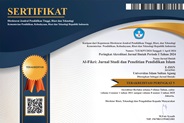KONSEP TRI UGERING NGAURIP MANGKUNEGARA IV SEBAGAI MOTIVASI PENGEMBANGAN KEWIRAUSAHAAN: PERSPEKTIF PENDIDIKAN ISLAM
Abstract
ABSTRACT
Tri Ugering Ngaurip is a teaching developed by K.G.P.A.A. Mangkunegara IV, the king of the Kraton Mangkunegaran - Surakarta, in his work called Serat Wedhatama which contains three handles of life that must be owned by Javanese society. With these three concepts, the community will have a motivating guide in developing skills and achieving life direction based on Islamic perspectives that tend to be tassawuf.
Tri ugering Ngaurip concept is interesting to be discussed because it reveals financial independence, guarding honor, and trying to gain intelligence. These three things are stated to be the handle of Javanese people's life which includes arta (wealth or economy), wirya (glory), and winasis (intelligence). In the realm of education development, it should be directed towards achieving these three categories. This concept is actually a description of the Javanese philosophical expression of "work" by choosing the term "pangupa soul pangupa" (looking for food for the soul).
Wirya means honor, nobility, and dignity possessed by someone in his community. This concept also includes moral and ethics that must be possessed by someone in the process of social interaction. Arta or economy plays a role in people's lives. While Winasis is directed at the conception of multidimensional intelligence, namely emotional, intellectual, and spiritual.
The achievement of tri ugering ngaurip is a motivation that underlies Javanese society to cultivate a livelihood, including the world of entrepreneurship. Practicing tri ugering ngaurip in life is actually the practice of trying to carry out religious obligations to earn a living. Therefore, the implementation of Islamic education should be insighted tri ugering urip , both as a motivation in developing entrepreneurship and in a more practical realm. This is actually an obligation that has been included from the beginning to Muslims.
Â
Keyword(s): serat wulang, arta, wirya, winasis
Full Text:
PDFReferences
DAFTAR PUSTAKA
Abdullah, Rahmad, 2015, Walisongo: Gelora Dakwah dan Jihad di Tanah Jawa, Surakarta: Penerbit Al-Wafi
Agustian, Ary Ginanjar, 2004, Rahasia Sukses Membangkitkan ESQ Power, Jakarta: Arga
Dakir dan Sardimi, 2011, Pendidikan Islam dan ESQ: Komparasi Integratif Upaya Menuju Stadium Insan Kamil, Semarang: RaSAIL
Kasali, Rhenald, et.all, 2012, Modul Kewirausahaan Untuk Program Strata 1, Cetakan III, Bandung: Mizan Media Utama
Mangunlesana (ed.), Kidung Sesingir: Serat Piwulang Dalem Ingkang Sinuhun Kangjeng Susuhunan Paku Buwana Kaping IX ing Nagari Surakarta – Hadiningrat, Surakarta: Pelajar
Poerwadarminta, W. J.S., 1943, Kawi Jarwa, Jakarta: Bale Poestaka.
Santosa, Iwan, 2011, Legiun Mangkunegaran (1808-1942): Tentara Jawa-Perancis Warisan Napoleon Bonaparte, Jakarta: Kompas
Soedjonoredjo, 1937, Wédatama Winardi, Kediri: Tan Khoen Swie
Sugihartono, et all, 2007, Psikologi Pendidikan, Yogyakarta: UNY Press
Sukri, Sri Suhandjati, 2004, Ijtihad Progresif Yasadipura II dalam Akulturasi Islam dengan Budaya Jawa, Yogyakarta: Gama Media
Sunyoto, Agus, 2016, Atlas Wali Songo: Buku Pertama yang Mengungkap Wali Songo Sebagai Fakta Sejarah, Bandung: Mizan Media Utama
Supadie, Didiek Ahmad, 2015a, Pengantar Studi Islam, Edisi Revisi, Cetakan III, Jakarta: RajaGrafindo Persada
Supadie, Didiek Ahmad, 2015b, Studi Islam II, Jakarta: RajaGrafindo Persada
Tafsir, Ahmad, 2012a, Ilmu Pendidikan Islami, Bandung: Rosdakarya.
Tafsir, Ahmad, 2012b, Filsafat Pendidikan Islami: Integrasi Jasmani, Rohani, dan Kalbu Memanusiakan Manusia, Cetakan V, Jakarta: Rosdakarya
Tjandrasasmita, Uka, 2009, Arkeologi Islam Nusantara, Jakarta: Gramedia
Winter, C. F., 1928, Sêrat Isi Têmbung Kawi Mawi Têgêsipun, Reproductiebedrijf v/d Topografischen Dienst.
Yunus, Mahmud, 2008, Sejarah Pendidikan Islam di Indonesia, Cetakan III, Jakarta: Penerbit Mahmud Yunus Wadzurriyah
DOI: https://dx.doi.org/10.30659/jspi.v3i1.8461
Refbacks
- There are currently no refbacks.
Al-Fikri is published by the Department of Islamic Religious Education, Faculty of Islamic Studies, Universitas Islam Sultan Agung, Semarang, Indonesia.

This work is licensed under a Creative Commons Attribution 4.0 International License








